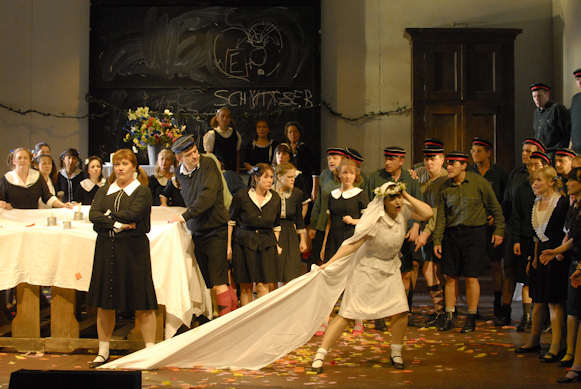Other Links
Editorial Board
-
Editor - Bill Kenny
- Founder - Len Mullenger
Google Site Search
SEEN AND HEARD
INTERNATIONAL OPERA REVIEW Wagner, Lohengrin: Soloists, Leipzig Opera Chorus, Leipzig Gewandhaus Orchestra, Ulf Schirmer (conductor) Leipzig Opera House, 18.12.2009 (MB) Herald – Jürgen Kurth Elsa – Gun-Brit Barkmin Friedrich von Telramund – Hans-Joachim Ketelsen King Henry the Fowler – James Moellenhoff Lohengrin – Stefan Vinke Ortrud – Gabriele Schnaut Brabantian Nobles – Tommaso Randazzo, Timothy Fallon, Tomas Möwes, Miklós Sebestyén Pages – Hitomi Okuzumi, Haike Hauptmann, Cornelia Röser, Claudia Schwarzmann Gottfried – Lukas Vinke King’s Trumpeters – Sebastian Taubert, Wilfried Thoß, Alexander Pfeifer, Robert Wintzen Peter Konwitschny (director) Wolfgang Bücker (stage rehearsal) Helmut Brade (designs) Helmut Brade, Inga von Bredow (costumes) Leipzig Opera Chorus (chorus master: Sören Eckhoff) Peter Konwitschny’s production of Lohengrin has become quite celebrated, but this was the first time I had seen it, whether in the theatre or on DVD. It has many strengths, though there are sections, especially earlier on during the third act, which transfer less well to the schoolroom setting. (A wedding is one thing, but preparations for a wedding night? Laying out of the marital bed is a strange form of sex education for what appears to be a rather old-fashioned kind of establishment, however universal the acclaim for Lohengrin as leader.) Clearly, someone who objects to the very idea of updating/relocating will
immediately object here, but Konwitschny’s production is not one of those translations to a Stevenage multi-storey car park for the sake of it. Mark Berry

Gabriele Schnaut (Ortrud) and Gun-Brit Barkmin (Elsa von Brabant)
Issues of leadership, exclusion, (forbidden) knowledge, and sexual politics can be illuminated by this particular setting – and in many ways are. Lord of the Flies springs to mind more than once in the fickleness of the mob and the way it turns upon Telramund and Ortrud. Helmut Brade’s designs and costumes, the latter in collaboration with Inga von Bredow, successfully evoke both conformity and individual characterisation.
Here, as much as in Stefan Herheim’s superlative Berlin production, any black-and-white sense of ‘rightness’ concerning Lohengrin’s cause is rendered untenable. Lohengrin’s charismatic power is more potent than the traditional, legal forms pertaining to King Henry – incidentally, it was unclear to me whether he was prefect, master, or someone else – but is inherently unstable. The road to 1933 is one of Konwitschny’s concerns: a thorny issue, to put it mildly, but failing to address it at all leaves the road clear for those who misunderstand or misrepresent. There is something undeniably chilling in this context to hear Lohengrin introduce Gottfried: ‘Seht da den Herzog von Brabant! Zum Führer sei er euch ernannt!’ However, the appearance of a boy with a machine gun might be going too far for some, arguably too far for the parameters of the production. What, after all, is the alternative? Ortrud? There were a good few boos for the production team at the end, though wild enthusiasm was more common.
There are also lighter touches, wittier than one might have expected from Konwitschny. Whether or no it actually ‘meant’ anything, I liked Ortrud’s dispatching of the girl organist at the end of the second act, so that she could assume the role for herself. Keen observation of the dynamics between individual members of the chorus heightens dramatic credibility.
The Leipzig Gewandhaus Orchestra was on excellent form: if not quite so ‘old German’ in sound as, say, the state orchestras of Berlin or Dresden, then still recognisably of that ilk, doubtless partly a product of East German shielding from international homogenisation. The gleaming strings of the first act Prelude continued to be a treat, whilst the third act’s brass fanfares from around the theatre provided a magnificent yet frightening premonition of military excitement, rejoicing, hubris, and calamity. The Leipzig Opera Chorus was equally impressive, solidly prepared by Sören Eckhoff and well directed on stage. Ulf Schirmer’s conducting did not draw attention to itself, yet it was a signal achievement to serve both score and production with no apparent discrepancy. Such could only result from thorough grounding in this challengingly transitional score – how far to ‘music drama’? – and ability to communicate that understanding.
Stefan Vinke, whom I had previously admired in the Leipzig production of Parsifal, proved an excellent Lohengrin. Klaus Florian Vogt remains hors concours amongst contemporary exponents; Vinke, however, stands closer to traditional expectations. Initially, I wondered whether he might prove a little too baritonal, but fine command of line and tone put paid to such concerns. I should be keen to hear his Rienzi, another Leipzig role. As Telramund, Hans-Joachim Ketelsen struck the right balance – shifting, as it must – between confidence and insecurity, dramatically rather than technically speaking. Gun-Brit Barkmin, however, was a variable Elsa. Though there were times when she attained a radiant lyricism, she audibly struggled at others; moreover, she lacked the purity of tone the role really demands – arguably less of a problem in this production than it would have been in many others. Then there was Gabriele Schnaut, a late replacement for Susan Maclean, who was still due to sing Ortrud for subsequent performances. Schnaut can act, and threw her all into the role, yet her vibrato is now so wide and so constant that pitch was often highly uncertain. I was somewhat disappointed by the King Henry of James Moellenhoff, recently an impressive Hagen at Covent Garden; his voice seemed to have been sapped.
Still, even when the singing did not match the orchestra and production, it barely detracted from an extremely powerful dramatic experience. Konwitschny’s tenure as direction of productions in Leipzig bids fair to court controversy and acclaim, with good reason for both.
Picture © Andreas Birkigt
